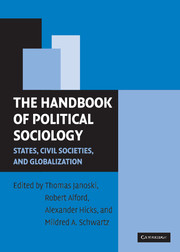Book contents
- Frontmatter
- Contents
- Preface
- Contributors
- Political Sociology in the New Millenium
- PART I THEORIES OF POLITICAL SOCIOLOGY
- PART II CIVIL SOCIETY: THE ROOTS AND PROCESSES OF POLITICAL ACTION
- 10 Money, Participation, and Votes
- 11 Public Opinion, Political Attitudes, and Ideology
- 12 Nationalism in Comparative Perspective
- 13 Political Parties
- 14 Organized Interest Groups and Policy Networks
- 15 Corporate Control, Interfirm Relations, and Corporate Power
- 16 Social Movements and Social Change
- 17 Toward a Political Sociology of the News Media
- PART III THE STATE AND ITS MANIFESTATIONS
- PART IV STATE POLICY AND INNOVATIONS
- PART V GLOBALIZATION AND POLITICAL SOCIOLOGY
- References
- Name Index
- Subject Index
11 - Public Opinion, Political Attitudes, and Ideology
Published online by Cambridge University Press: 05 June 2012
- Frontmatter
- Contents
- Preface
- Contributors
- Political Sociology in the New Millenium
- PART I THEORIES OF POLITICAL SOCIOLOGY
- PART II CIVIL SOCIETY: THE ROOTS AND PROCESSES OF POLITICAL ACTION
- 10 Money, Participation, and Votes
- 11 Public Opinion, Political Attitudes, and Ideology
- 12 Nationalism in Comparative Perspective
- 13 Political Parties
- 14 Organized Interest Groups and Policy Networks
- 15 Corporate Control, Interfirm Relations, and Corporate Power
- 16 Social Movements and Social Change
- 17 Toward a Political Sociology of the News Media
- PART III THE STATE AND ITS MANIFESTATIONS
- PART IV STATE POLICY AND INNOVATIONS
- PART V GLOBALIZATION AND POLITICAL SOCIOLOGY
- References
- Name Index
- Subject Index
Summary
This chapter devotes roughly equal attention to recent research and work from the 1950s and 1960s. This dual focus is necessary because of the history of public opinion research. Political sociologists originally played a prominent part but tended to abandon the field after the late 1960s, for reasons that are discussed in the section on recent research. Hence, most contemporary public opinion research is oriented toward social psychology. The older research attempted to address macrosociological questions such as the sources of stable democracy or variations in the strength of socialist parties and hence remains relevant to the interests of political sociologists.
The chapter begins with a discussion of the distinction between sociological and political approaches to public opinion. Next, three strands of research from the 1950s and 1960s are reviewed: the Columbia voting studies, which focused on networks of communication and their role in creating and maintaining group differences; the Michigan studies, which focused on explaining short-term political change; and the “social cleavages” approach represented by Lipset (1960[1981]), which focused on long-term change and national comparisons. After discussing the reasons for the decline of public opinion research in political sociology, I then review four areas of contemporary research: the relationship between economic development and public opinion; framing and ideology; the effect of public opinion on policy, and “policy feedback” or the effect of policy on public opinion. Finally, the concluding section suggests directions for future research.
- Type
- Chapter
- Information
- The Handbook of Political SociologyStates, Civil Societies, and Globalization, pp. 227 - 246Publisher: Cambridge University PressPrint publication year: 2003



